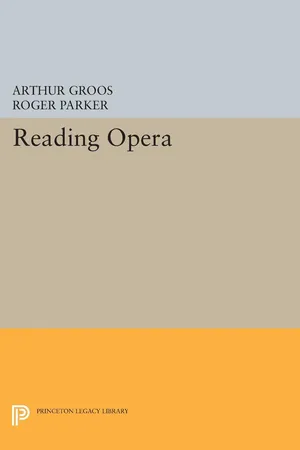
Reading Opera
- 364 pages
- English
- PDF
- Available on iOS & Android
About this book
"Libretto-bashing has a distinguished tradition in the blood sport of opera," writes Arthur Groos in the introduction to this broad survey of critical approaches to that much-maligned genre. To examine, and to challenge, the long-standing prejudice against libretti and the scholarly tradition that has, until recently, reiterated it, Groos and Roger Parker have commissioned thirteen stimulating essays by musicologists, literary critics, and historians. Taken as a whole, the volume demonstrates that libretti are now very much within the purview of contemporary humanistic scholarship. Libretti pose questions of intertextuality, transposition of genre, and reception history. They invite a broad spectrum of contemporary reading strategies ranging from the formalistic to the feminist. And as texts for music they raise issues in the relation between the two mediums and their respective traditions. Reading Opera will be of value to anyone with a serious interest in opera and contemporary opera criticism. The essays cover the period from the early nineteenth to the early twentieth centuries, with a particular focus on works of the later nineteenth century. The contributors are Carolyn Abbate, William Ashbrook, Katherine Bergeron, Caryl Emerson, Nelly Furman, Sander L. Gilman, Arthur Groos, James A. Hepokoski, Jurgen Maehder, Roger Parker, Paul Robinson, Christopher Wintle, and Susan Youens.
Originally published in 1988.
The Princeton Legacy Library uses the latest print-on-demand technology to again make available previously out-of-print books from the distinguished backlist of Princeton University Press. These editions preserve the original texts of these important books while presenting them in durable paperback and hardcover editions. The goal of the Princeton Legacy Library is to vastly increase access to the rich scholarly heritage found in the thousands of books published by Princeton University Press since its founding in 1905.
Tools to learn more effectively

Saving Books

Keyword Search

Annotating Text

Listen to it instead
Information
Table of contents
- Cover
- Contents
- Acknowledgments
- Introduction
- Appropriation in Wagner's Tristan Libretto
- Boito and F.-V. Hugo's "Magnificent Translation": A Study in the Genesis of the Otello Libretto
- An Unseen Player: Destiny in Pelléas et Mélisande
- The Origins of Italian Literaturoper: Guglielmo Ratcliff, La Figlia di Iorio, Parisina, and Francesca da Rimini
- Erik's Dream and Tannhäuser's Journey
- The Languages of Love in Carmen
- How to Avoid Believing (While Reading Iago's "Credo")
- The Numinous in Götterdämmerung
- Musorgsky's Libretti on Historical Themes: From the Two Borises to Khovanshchina
- Boito and the 1868 Mefistofele Libretto as a Reform Text
- On Reading Nineteenth-Century Opera: Verdi through the Looking-Glass
- Strauss and the Pervert
- A Deconstructive Postscript: Reading Libretti and Misreading Opera
- Index
Frequently asked questions
- Essential is ideal for learners and professionals who enjoy exploring a wide range of subjects. Access the Essential Library with 800,000+ trusted titles and best-sellers across business, personal growth, and the humanities. Includes unlimited reading time and Standard Read Aloud voice.
- Complete: Perfect for advanced learners and researchers needing full, unrestricted access. Unlock 1.4M+ books across hundreds of subjects, including academic and specialized titles. The Complete Plan also includes advanced features like Premium Read Aloud and Research Assistant.
Please note we cannot support devices running on iOS 13 and Android 7 or earlier. Learn more about using the app